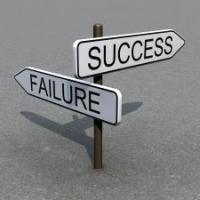Learning from Failure

Failing used to be considered a bad thing. Now it's the “in” thing. Indeed, to judge from all the attention failure is getting in some circles, failure is the new success. If you want to succeed, you have to fail, or so it's claimed.
So, the more failures you have, the more you learn, and therefore the better your chances of success—right? I'm not sure it follows that yet another failure and another and another means that success is ultimately assured. Using that kind of logic, total losers would be the biggest winners of all.
Anyway, if you fail repeatedly, one might reasonably ask, why is that happening? What is it that you still haven't figured out?
It’s not that failure is without significant benefits, as JK Rowling of Harry Potter fame emphasizes in this video. One such benefit, and a rather large one, is that failure causes you to take a good, hard look at your life, including what’s working and what’s not, in a way that you're not likely to do when you're successful.
The key to benefiting from failure is acknowledging it, owning up to it, and learning from it. Whether it's just a minor mistake that diverts you from your goal or a real doozie that turns everything topsy-turvy, there's a lot to be gained by analyzing what went wrong and what you want to do differently next time around as a result. Conferences that focus on failure in the startup world are going one step further by letting those who have yet to fail (at least in a particular way) learn from those who've been there and done that.
Certainly, failure isn't any one thing, and some people find it helpful to identify different types of failure. Among the seven types listed in this leadership article, for example, are failure to prioritize, failure to decide, and failure to trust. To these, I'd add failure to stop when the path you're on is leading you astray, failure to admit not knowing what to do, and failure to start—for fear of failure.
In the realm of software projects, many types of failure relentlessly loom large, not least including failure to communicate, failure to establish realistic timelines and deliverables, and failure to pay attention when the warning signs are shouting at you that you're headed for failure. Indeed, this many types of failure provide a monumental number of opportunities to learn how to succeed.
Lots of people you've heard of have had pithy things to say about failure. My favorite, from Thomas Edison, is "I have not failed. I've just found 10,000 ways that won't work." With that as inspiration, most of us still have thousands of ways not to fail.

